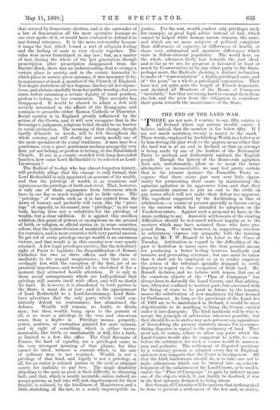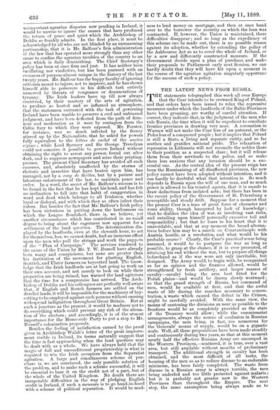THE END OF THE LAND WAR.
" THERE are not now, I venture to say, fifty estates in all Ireland where any serious trouble exists ; I believe, indeed, that the number is far below fifty. If I am not much mistaken, twenty is nearer to the mark." These words, employed by Archbishop Walsh in a letter sent by him during the past week to the papers, mean either that the land war is at an end in Ireland, or that an attempt is being made by one of the leaders of the Nationalist Party to mislead, and deliberately mislead, the English people. Though the history of the Home-rule agitation does not, unfortunately, allow us to scout the latter alternative as inconceivable, we may feel pretty certain that in the present instance the Parnellite Party re- cognise that there exists just now very little oppor- tnnity for prosecuting their cause by maintaining the agrarian agitation in its aggressive form, and that they are genuinely anxious to put an end to the strife on any terms which will not make their defeat too apparent. The expedient suggested by the Archbishop is that of arbitration,—a course at present specially in favour owing to the success which has attended its adoption on the Vandeleur estate. Against such a proposal we have, in the main, nothing to say. Amicable settlements of the existing difficulties should be welcomed without inquiry as to the motives which may have actuated those who have pro- posed them. We must, however, in supporting recourse to arbitration, express our sympathy with the warning given by Mr. T. W. Russell in his letter to the Times of Tuesday. Arbitration in regard to the difficulties of the past is doubtless in many cases the best possible means for producing a better feeling between landlords and tenants, and preventing evictions ; but care must be taken that it shall not be employed so as to render nugatory the action of the tribunals specially designed to settle disputes in regard to the occupation of Irish land. Mr. Russell declares, and we believe with reason, that one of the conscious objects of the "Plan of Campaign" has always been to discredit the Land Courts, and that arbitra- tion, when not confined to matters past, but concerned with the fixing of rents to be paid in future by the tenants, means the substitution of new machinery for that devised by Parliament. As long as the provisions of the Land Act of 1881 are to be maintained in Ireland, it would be most objectionable to do anything to bring the Courts erected under it into disrepute. The Irish landlords will be wise to accept the principle of arbitration wherever possible ; but they should do so in such a way as to prevent any appearance of discrediting the present statutory means for accommo- dating disputes in regard to the occupancy of land. They need not, of course, refuse to allow any point which the Land Courts would also be competent to settle, to come before the arbitrator, for such a course would be unneces- sary and pedantic. The settlement of disputed questions by a voluntary process is adopted every day in England, and in no way suggests that the Court is incompetent. All that the Irish landowners should do, is to take care not to make admissions which can be twisted into an acknow- ledgment of the unfairness of the Land Courts, or be used to enable the "Plan of Campaign" to gain by indirect means one of the objects which, it can hardly be doubted, it WU in the first instance designed to bring about.
But though all Unionists will be anxious that nothing shall be done to prevent a settlement of the few and, in reality, unimportant agrarian disputes now pending in Ireland, it would be unwise to ignore the causes that have produced the return of peace and quiet which the Archbishop of Dublin so frankly admits. In the first place, it must be acknowledged by all who are not blinded by an unreasoning partisanship, that it is Mr. Balfour's firm administration of the law that has operated more strongly than any other cause to confine the agrarian troubles of the country to an area which is daily diminishing. The Chief Secretary's policy has been at once firm and just. It has neither been vacillating nor vindictive, but has been pursued with an evenness of purpose almost unique in the history of the last twenty years. Mr. Balfour has the happy faculty of ignoring criticism meant to injure, not to improve, and he has shown himself able to persevere in his difficult task entirely unmoved by threats of vengeance or denunciations of tyranny. The Irish leaders have up till now always contrived, by their mastery of the arts of agitation, to produce so heated and so inflamed an atmosphere, that the statesmen entrusted with the task of governing Ireland have been unable to preserve a cool and unbiassed judgment, and have Wen deflected from the path of firm- ness and moderation as it were by contagion from the Celtic fury to which they were exposed. Mr. Forster, for instance, was so much infected by the frenzy stirred up by the Nationalists, that he asked for powers fully equivalent to the lettres de cachet of the ancien regime; while Lord Spencer and Sir George Trevelyan could not conceive it possible to govern Ireland without obtaining the right to arrest any person found out after dark, and to suppress newspapers and seize their printing- presses. The present Chief Secretary has avoided all such excesses, and, absolutely unaffected by the storms of rhetoric and invective that have beaten upon him, has managed, not by a coup de theatre, but by a patient and laborious enforcement of the law, to maintain peace and order. In a word, the secret of Mr. Balfour's success is to be found in the fact that he has kept his head, and has felt no inclination to fall into that habit of exaggeration in word and deed which belongs to all Irishmen, whether loyal or disloyal, and with which they so often infect their rulers. But besides the fact that Mr. Balfour's Irish policy has been victorious in putting down the lawlessness on -which the League flourished, there is, we believe, yet :another circumstance which has contributed in no small degree to bring about the eagerness now apparent for a settlement of the land question. The determination dis- played by the landlords, even at the eleventh hour, to act for themselves, has, we cannot doubt, had an immense effect upon the men who pull the strings and work the puppets of the "Plan of Campaign." The services rendered to -the cause of the Union by Mr. T. W. Russell have already been many and conspicuous, but none are greater than his institution of the movement for planting English, Scottish, and Ulster farmers on boycotted land. The know- ledge that the Irish landlords are at last going to work on their own account, and not merely to look on while their properties are being ruined, has warned the land agitators that the time for a compromise has arrived. The Arch- bishop of Dublin and his colleagues are perfectly well aware that, if English and Scotch farmers are settled on the derelict lands, it will be impossible for the machinery of boy- cotting to be employed against such persons without causing widespread indignation throughout Great Britain. But at such a juncture as the present, it would be madness not to do everything which could prevent any risk of the aliena- tion of the electors ; and accordingly, it is of the utmost importance for the Home-rule Party to put a stop to Mr. Russell's colonisation proposals. Besides the feeling of satisfaction caused by the proof given in Archbishop Walsh's letter of the great improve- ment visible in Ireland, its terms naturally suggest that the time is fast approaching when the land question may W dealt with as a whole. We have always held that the magic of full and unconditional proprietorship is what is required to win the Irish occupiers from the Separatist agitation. A large and simultaneous scheme of pur- chase is, we are convinced, the only possible solution of the problem, and to make such a scheme successful, it will be essential to base it on the credit not of a part, but of the whole of the United Kingdom. No doubt there are insuperable difficulties in the way of pledging English credit in Ireland, if such a measure is to go hand-in-hand with a scheme of political separation. It would be mad- ness to lend money on mortgage, and then at once hand over to the borrower the security on which the loan was contracted. If, however, the Union is maintained, these difficulties disappear ; and so long as the expediency of this scheme can be made out, there is no possible reason against its adoption, whether by extending the policy of the Ashbourne Act so as to cover the whole of Ireland, or by a new and differently constructed measure. If the Government decide upon a plan of purchase, and make their proposals to Parliament early next Session, we can hardly doubt that they will have hit upon a moment in the course of the agrarian agitation singularly opportune for the success of such a policy.







































 Previous page
Previous page